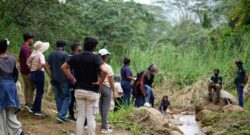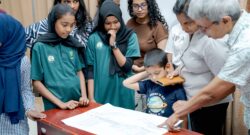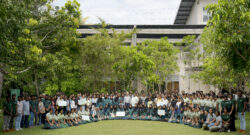Author: Nathasha Silva
Say Hello to D-Island: A Unique Home for Sri Lanka’s Rare Dipterocarps
At our Endane Biodiversity Corridor in Rathnapura, something special was brought to life – D-Island, a one-of-a-kind arboretum in Sri Lanka. Created earlier this year in partnership with the Faculty of Agriculture, University of Ruhuna, D-Island is a living collection dedicated to the Dipterocarpaceae family – a group of trees that form the backbone of our lowland rainforests. In just two days, we planted 40 seedlings representing 33 of the 58 Dipterocarpaceae species found in Sri Lanka. That’s more than half the species there! Why Dipterocarps? Dipterocarps grow slowly, and their seeds don’t last long, making natural regeneration tough. D-Island builds on Dilmah Conservation’s earlier arboretum efforts at Endane. First came the Memecylon plot, a unique nursery for threatened Memecylon species – some newly discovered. Now, D-Island takes things further, giving Sri Lanka’s slow-growing, rare Dipterocarps their own dedicated space. These special nurseries are vital as they protect threatened species and give them a real chance to thrive. Conserving and restoring these plants helps connect forest patches, support wildlife, safeguard biodiversity, and secure a future for these trees in Sri Lanka’s forests – just as we’ve been doing in our Endane Biodiversity Corridor, showing steady progress over the years. What’s next? We plan to promote these arebeortums as spaces for further learning about these flora species for both the general public and specialist groups. We imagine that such initiatives will awaken a new found love for botany among a new generation.
Wetlands After Dusk
Some events teach you facts. Others make you wish you had been there sooner. ‘Wetlands after Dusk’ at Beddagana Wetland Park did both. It was designed to help people understand the science, yes – but also to feel how alive, complex, and quietly busy a wetland really is. Starting with Water: The Foundation of It All The session opened with a short introduction by Narmadha Dangampola, and then we moved straight into action. A water quality testing demonstration took place alongside a mini clean-up, setting a simple but powerful message: if we want to understand ecosystems, we also have to care for them. Participants learned what pH really means (beyond textbook definitions), how oxygen and carbon dioxide levels naturally change between day and night, and why temperature shifts matter so much for aquatic life. The science was explained in a way that made it easy to connect the dots. One moment that caught everyone’s attention was the explanation of the ferrous oxide phenomenon – that rusty-looking layer sometimes seen floating on wetland water. Instead of being brushed off as ‘pollution’, it was explained as a chemical process shaped by wetland conditions. We also learned how plants, microbes, and animals constantly change water quality, reminding us that wetlands are not still or silent, they are always at work. Birds That Tell Time and Guard Territory As evening approached, the wetland slowly introduced its winged residents. Participants were guided through sightings and stories of nocturnal and migratory birds, including the Indian Pitta – popularly called the “6 o’clock bird”, the White-bellied Drongo, Brown Hawk Owl, Indian Nightjar, Jerdon’s Nightjar, Common Hawk Cuckoo, Black-crowned night Heron, and Whistling Duck. What made this session special wasn’t just naming species, but understanding behaviour. For instance, learning that the Indian pitta is highly territorial because it fiercely protects insect-rich feeding areas helped people see birds not just as visitors, but as active managers of their own ecosystems. The Small Creatures Doing Big Work Next came a topic many don’t usually associate with wetlands – small mammals. Prof. Saminda Fernando, a Professor of Zoology, explained their crucial role in seed dispersal and ecosystem balance. He walked participants through how animals are studied ethically using live traps such as Sherman traps, Longworth traps, pitfall traps, and mesh or cage traps. Did you know? small mammals are generally defined as animals weighing under 500 grams. Frogs: The Wetland’s Early Warning System If there was one moment where people truly leaned in, it was during the amphibian session by Sanoj Wijayasekara. Frog calls filled the night as he played recordings and demonstrated how these sounds are captured and analysed using specialised software. What stayed with many participants was the idea that frogs respond to environmental change at a micro-habitat level. Long before humans notice a problem, frogs are already reacting. Suddenly, their calls felt less like background noise and more like important messages. Moths, Light, and Subtle Signs of Change Under a simple white sheet and artificial light, Nuwan Jayawardene, a Lepidoptera expert, revealed a surprisingly rich world of moths. He explained that moth observation is completely non-lethal, the insects are never touched. Participants were intrigued to learn that rising pollution and darker environments are linked to an increase in brown-coloured moth species. Even more impactful was hearing that this research feeds directly into reviews for Sri Lanka’s National Red List, showing how quiet fieldwork can influence national conservation decisions. Bats: Misunderstood, But Essential The bat session by Dr. Tharaka Kusuminda, a bat biologist, changed a few minds that evening. He explained why bats evolved to roost upside down, how complex their social and mating calls are, and why they play such an important role in controlling insect populations. Participants were also introduced to safe research methods like mist netting and harp netting, giving insight into how science is done responsibly. Carnivores, Conflict, and Coexistence The conversation talks then moved to larger mammals. Sethil Muhandiram, Leopard Conservationist, spoke about leopard behaviour, breaking down common fears. Learning that leopards usually do not attack standing humans, but may react to crouching, prey-like behaviour. Camera trapping was introduced as a non-invasive research tool, with details on placement, distance, and even why researchers wear gloves to avoid leaving scent. Participants also learned that there are eight leopard subspecies worldwide, and that the Sri Lankan leopard is the largest, confirmed through DNA research by Dr. Sriyanie Miththapala. Adding another layer, Ashan Thudugala, Carnivore Conservationist, shared insights into fishing cat research, highlighting how wetlands are essential for the survival of this elusive species. Ending the Night Where Learning Began The Wetland Night Walk brought everything together. By then, participants weren’t just observing, they were noticing patterns, listening differently, and asking better questions. The wetland felt less like a park and more like a classroom without walls. Why This Event Truly Worked What made this event successful was not just the expertise in the room, but how that knowledge was shared clearly, and patiently. The science was understandable, the learning felt exciting, and the experience left many thinking, “I don’t want to miss the next one.” The overwhelmingly positive feedback confirmed this. For Dilmah Conservation, the evening reinforced something important: when people are given the chance to experience nature this closely, curiosity turns into care. And that’s exactly why more events like this matter, not just for learning, but for building lasting connections between people and the ecosystems that support them.
Grey2Green Gathers Momentum
What happens when young minds and experienced voices come together to rethink urban spaces? That’s exactly how the first Grey2Green session began at the One Earth Centre, Moratuwa. The session kicked off with an energetic icebreaker, where participants teamed up across age and experience to suggest one green change for a given space. The ideas flowed quickly from plants as natural noise barriers along busy roads, to edible gardens and green walls, setting the tone for a session rooted in creativity and practical thinking. The momentum continued with a key presentation by Ms. Saduni Alahendra, Researcher in Urban Trees and Forestry, Colombo Municipal Council, as she shared valuable insights on urban greening, highlighting what to watch out for when designing green spaces in cities, and deepening participants’ understanding of urban forestry. The presentation was delivered in both English and Sinhala, enabling wider participation and engagement. The Q&A was particularly fruitful, giving us a chance to hear the audience’s perspective as they shared feedback, reflected on progress, and discussed challenges and the way forward for urban greening efforts. The session concluded with another hands-on group activity, this time applying the knowledge from the presentation. Teams worked on different spaces, from temple grounds to university environments using drawing, planning, and design skills to decide which plants should go where. Each choice came with clear reasoning, highlighting the importance of thoughtful plant selection in creating greener, more sustainable urban spaces, with insights from our presenter to suggest improvements or better plant choices where needed. Overall, the session was highly effective, engaging, and practical, setting a strong foundation for what’s to come. Stay tuned! Details of the next Grey2Green session will be shared soon.
12 Days of Christmas!
This Christmas, we turned the season of giving into a gentle reminder of what truly matters – kindness, to people and to the planet. Through our 12 Days of Christmas series on Dilmah’s Instagram pages, we shared stories from across Dilmah Conservation and the MJF Charitable Foundation, reflecting the ultimate vision of our Founder: kindness. From caring for communities, awareness, empowerment and advocacy to protecting ecosystems, here’s a glimpse of the initiatives we celebrated: On the first day of Christmas,Little hands giving hope —preschoolers helping children rebuild after floods. Our preschoolers from the MJF Foundation Moratuwa Centre became little volunteers- helping collect and send brand-new school essentials to children in the Central Province who lost everything. On the second day of Christmas,Sharing space with leopards — science and coexistence in the highlands The misty highlands of Sri Lanka are home to the Sri Lankan leopard, who also moves through the Dilmah Queensberry Estate. Together with @leopoconsrilanka, we use research, technology, and community partnerships to better understand these elusive cats, and create safer spaces where people and wildlife can coexist. On the third day of Christmas,Oceans that protect us — making the invisible value of blue carbon visible. “Without a living ocean, we won’t have a living planet.” To make their value visible, we are partnering with Prof. Meththika Vithanage and the Ecosphere Resilience Research Center to measure carbon storage in Sri Lanka’s mangroves, seagrasses, and salt marshes, helping guide protection, policy, and investment for a safer, more resilient future. On the fourth day of Christmas,Secret Santas sharing time, laughter, and joy with children at CCCPDD. Our team at Dilmah Sri Lanka spent time at the Centre for Children with Cerebral Palsy & other Developmental Disorders (CCCPDD), operated by the MJF Foundation, sharing gifts, laughter, and meaningful moments with over 90 children and youth. On the fifth day of Christmas,Caring for wildlife keeps the land healthy and thriving — our model tea garden at Queensberry Estate blends bat conservation with natural pest control. Bats play a vital role in keeping ecosystems balanced, yet they are often misunderstood. At the model tea garden in Queensberry Estate, we combine bat conservation with natural pest control, allowing bats to thrive while reducing the need for chemical pesticides. On the sixth day of Christmas,A shared Christmas lunch — celebrating belonging with Lasallian preschoolers. Together with the Lasallian Community Education Services Centre, the MJF Foundation hosted a Christmas lunch for over 140 preschoolers in Mutwal to celebrate the end of their preschool journey. On the seventh day of Christmas,Students learning from nature — protecting pollinators through sustainable beekeeping. At the One Earth Centre, Moratuwa, students from local universities learn through real-world experience, from sustainable beekeeping to environmentally responsible farming. Since 2024, more than 300 students have gained practical knowledge that supports both nature and future livelihoods. On the eighth day of Christmas,Dreams revived at the People’s Market — empowering small entrepreneurs to rise again. Partnering with t-Lounge by Dilmah, we hosted our first two-day market in Colombo, supporting over 30 micro-entrepreneurs to rebuild, reconnect, and step into the festive season with hope. On the ninth day of Christmas,Education with purpose — hands-on learning that nurtures people and planet. Children from underprivileged communities often have few chances to experience nature. Recently, children from the MJF Foundation visited Beddagana Wetland Park, exploring trails, observing wildlife, and discovering the wonders of wetlands for the first time. On the tenth day of Christmas,Friendships that crossed borders — standing with tea garden families in times of crisis. For 8 years, our partners Tokai Co-op and Waltz & Co. (Japan) have supported preschoolers from our tea garden communities. This year, despite landslides caused by Cyclone Ditwah, they showed up. Their visit expanded into emergency support for flood-affected families On the eleventh day of Christmas,Art speaking for wildlife — creativity inspiring care for endangered species. Art is a universal language and a powerful voice for conservation. We recently hosted a special talk by veteran wildlife artist Gamini Ratnavira at Genesis by Dilmah: Centre for a Sustainable Future. On the twelfth day of Christmas,Cashew trees and community strength — growing climate-resilient livelihoods together. The Dilmah Cashew Project in Kalkudah, at pilot stage, supports 20 smallholder farmers across 20 acres, providing saplings, land preparation support, and training. By focusing on both farming and local cashew processing led by trained community women, we create jobs, strengthen incomes, and keep value within the community. These weren’t just Christmas stories. They were 12 small reminders of what we strive to do every day, creating positive impact through kindness, sustainability, and shared responsibility. Twelve days. One message. Kindness — all year round.
Turning Factory Waste into Christmas Decor
Christmas is often associated with new decorations, bright lights, and excess. This year, in the wake of recent disasters that affected the country, we chose to tone down traditional celebrations and focus on giving back, rather than indulging in excess. But that didn’t mean no celebration, instead, at this year’s “Find Your Inspiration” event, we found a more meaningful option: creating Christmas decorations using what was already at hand. Our factory staff were given the opportunity to craft decorations using only factory waste materials, a concept we had tried in a previous year and felt was especially fitting this time. These were few of the materials that were available to them, and this was what they created. Over the month of November, staff used their free time to design and build decorations, mainly Christmas trees, each one completely unique, full of imagination, patience, and thoughtful use of materials. No two designs were alike. What stood out most was how ordinary waste was transformed into festive pieces, proving that creativity doesn’t need new resources – just a fresh perspective. Creativity with a Purpose The activity was guided by clear objectives: Despite using similar waste materials, every decoration told a different story. The diversity in designs highlighted not only creativity, but also how each individual approached the challenge in their own way. Judging Criteria Entries were judged under the following criteria: The judging process celebrated effort, innovation, and thoughtful execution – not perfection. Winning Entries Here are our winners: Individual Category Group Category Congratulations to all! That’s proof that Christmas can be celebrated in an environmentally responsible way. “Find Your Inspiration” at Dilmah looks forward to bringing more inspiring initiatives next year.
On the Edge
Rethinking climate risk in Sri Lanka’s plantation heartlands was the focus of On the Edge – a timely event, in collaboration with Biodiversity Sri Lanka, held at Genesis by Dilmah, following the fatal impacts of Cyclone Ditwah. Mr. Dilhan C. Fernando, Chairman of Dilmah Ceylon Tea, in his welcome address, set the stage by emphasising why climate resilience, land use, and communities must be seen as deeply interconnected. Followed by four expert presentations by Prof. Buddhi Marambe, Prof. D.K.N.G. Pushpakumara, Dr. Keerthi Mohotti, and Mr. Binesh Pananwala, bringing together perspectives from climate science, landscape ecology, the tea value chain, and ground-level plantation management, moving into a panel discussion, moderated by Ms. Tharuka Dissanaike from the UNDP. The discussion went beyond recounting damage. Instead, it asked a deeper question: Are our plantation systems designed for the climate reality we now face? “Disasters don’t happen in isolation, they expose the cracks in our systems.” Climate Risk: More Than Just Extreme Weather Using Cyclone Ditwah as a case study, Prof. Buddhi Marambe from the University of Peradeniya explained that the damage was not caused by strength alone, but by slow movement and prolonged rainfall. “Disasters are not just about how strong an event is, but how long communities are exposed to it.” Sri Lanka already has climate data, disaster-prone area maps, and risk models. The challenge is not the lack of information, it is how rarely this data is used in planning and policy decisions. Climate adaptation, he stressed, must focus on early warning systems, resilient infrastructure, financial tools, strong governance, and community action, not reactive responses after damage is done. “Adaptation cannot happen in silos. Policy alignment across sectors is essential.” Landslides Don’t Start Where They End Prof. D. K. N. G. Pushpakumara reminded the audience that landslides are landscape-level phenomena. The visible site of damage is rarely the real cause. “Think systems, not symptoms.” What happens in upper catchments directly affects communities downstream. Natural forests remain one of the strongest defences against slope failure, and where forests are fragmented, biodiversity-rich tea landscapes can help bridge the gap. Well-managed tea lands, when designed thoughtfully, can reduce disaster risk while still supporting livelihoods. When Climate Shocks the Tea Value Chain Dr. Keerthi Mohotti, former Director/CEO of the Tea Research Institute, outlined how Cyclone Ditwah disrupted the entire tea value chain, from soil stability and transport to labour, infrastructure, and bush health. Traditional land classification based on soil type or past yields is no longer enough. “Disaster risk must now be built into land-use planning.” Future-ready plantations must adopt agroforestry, terrain-specific practices, mechanisation, smart technologies, and stronger social safeguards. Disaster preparedness including worker safety and evacuation planning must be embedded into existing certification systems such as HACCP and Rainforest Alliance. Ground Reality: Risk Has Fundamentally Changed Speaking from lived experience, Binesh Pananwala, CEO of Kahawatte Plantations PLC, challenged the belief that plantations are naturally resilient simply because they have existed for over 200 years. “That assumption no longer holds.” Recent disasters revealed a major weakness: communication failures. Some regions were cut off for days, and a fatal landslide went unreported due to inaccessibility. Plantations today support nearly 989,000 residents, far beyond their direct workforce. Labour shortages, reduced land control, and unregulated cultivation have increased vulnerability. “Preparedness weakens when land use, livelihoods, and responsibility fall out of sync.” He also shared Dilmah’s GPS-based landslide risk mapping initiative, enabling rainfall monitoring, soil movement tracking, and predictive modelling, a tool with potential benefits for the wider industry. This panel discussion was born from the vision of Ms. Medini Igoor, whose idea sparked a timely collaboration with Biodiversity Sri Lanka, not just to address immediate disaster recovery, but to look at the bigger picture of climate resilience, landscape management, and the future of Sri Lanka’s plantation heartlands. What the Panel Agreed On “Resilience is not just about recovery — it is about redesign.” Stronger state regulation, enforcement, and private sector participation are critical. On the Edge made it clear: Resilience will not come from reacting to disasters, but from rethinking landscapes, governance, and how we live with a changing climate.
Honoured & Grateful – Dilmah’s Commitment Recognised in 2025
We are humbled to share a few meaningful recognitions that reflect the heart of who we are; a family business built on kindness, integrity, and a deep responsibility to people and nature. Dilmah has been named ‘Most Influential’ at the 2025 Sustainability Tracker Awards in Australia, one of the most respected benchmarks for genuine sustainability leadership. The award recognises companies that drive long-term, real-world impact across their operations, products, and industries. This honour reflects our commitment to certified sustainable practices, strong partnerships, measurable positive impact, and the continuous effort to make responsible choices accessible to everyone. Most importantly, it celebrates the collective effort of our community, partners, and every individual who believes in meaningful, lasting change. At the same time, we are proud to be listed among the Top 10 Sustainability Corporate Citizens in Sri Lanka for the sixth consecutive year; a recognition that reinforces our consistency, resilience, and authenticity in sustainability. This year, we were also acknowledged for our work in resilient business practices and customer relations, and our social responsibility arm, the MJF Charitable Foundation, received the Best Project Award for the Empower Culinary and Hospitality School — a programme that continues to shape futures by giving young people real opportunities to grow, learn, and lead. Proud of our Sri Lankan heritage and our journey as a global Sri Lankan brand, we are honoured to be recognised at this year’s Presidential Export Awards in Sri Lanka as well. Our achievements for the financial year 2024/25 include the Overall Award for Market Diversified Exporter of the Year, along with a Sectoral Merit Award in the Tea – Large Category. We are also proud to have received the Overall Award for Contribution to Sustainable Development in Exports, reflecting our continued commitment to responsible growth and deep commitment to biodiversity protection and a science-based pathway to net zero. Yet for us, these honours are not the destination.They are reminders of the values our founder instilled, that business must serve people, uplift communities, and protect the environment we all depend on. Our ongoing commitment to biodiversity conservation, community wellbeing, and our journey towards net zero by 2050 continues that legacy. To everyone who has walked beside us, thank you.Your belief in responsible business fuels our purpose. Learn more about how Dilmah is creating positive impact for people and the planet: Read here
Dilmah launches Grey2Green: An Urban Greening Project
Colombo is heating up! Over the past 20 years, rising concrete and shrinking greenery have pushed temperatures in the city’s built-up areas up by nearly 4°C. With this growing heat challenge, the message is clear: our city needs more green. That’s where Grey2Green steps in. Dilmah Conservation, together with the United Nations Global Compact Sri Lanka, launched Grey2Green; a fresh, citizen-led movement that invites everyone from university students to office teams, neighbourhood groups, and institutions to turn underused “grey” corners of the city into living, breathing green spaces. It’s more than just a tree-planting campaign. It’s a grassroots greening movement powered by people. Grey2Green encourages the public to transform rooftops, abandoned land, industrial plots, and neglected urban patches into pockets of biodiversity, focusing on, Urban forestry, Plant ecology, Landscape design, Ecosystem management. All to ensure that every green space created isn’t just beautiful — it’s ecologically meaningful and sustainable. Inspired by the One Earth Urban Arboretum One of the strongest inspirations behind this movement is the One Earth Urban Arboretum at our Moratuwa Centre — once an industrial waste site, now home to over 300 trees and shrubs. The transformation stands as a powerful reminder that even the most degraded spaces can be revived with science, care, and community effort. Grey2Green aims to replicate this model across Colombo and its suburbs, one restored space at a time. Event Highlights To spark conversation, the event began with an interactive Mentimeter quiz, inviting the audience to share their perceptions of urban greening. The responses helped set the tone, making it clear that people are ready, eager, and passionate about reimagining their city. Messages from the Experts The speakers shared insights that grounded the movement in both science and heart. Dr. Jagath Gunawardana, environmental lawyer, reminded us that green spaces are refuges for both wildlife and people. “If we stop seeing green, we will slowly lose our balance. Nature is not a luxury. It is a necessity.” Dr. Himesh Jayasinghe, plant taxonomist, highlighted the need for the right plants, the right planning, and strong community involvement. “Everyone wants green spaces, but we must also protect them. Leave only footprints.” Dr. Ajith Gunawardena from the Central Environmental Authority emphasized that urban greening is already a national priority, and young people and volunteers will play a crucial role in monitoring and stewardship. Treshan Galappathy of UNGC Sri Lanka connected Grey2Green to SDG 11 (Sustainable Cities) and SDG 13 (Climate Action) — reminding us that urban greening is a local action with global impact. Join the Movement Grey2Green is an invitation to co-create a Colombo where trees cool our streets, birds return to our skies, and communities thrive in healthier, happier spaces. Whether you’re a student, a neighbourhood group, an office, or simply someone who loves this city, you can be part of the change. Contact Dilmah Conservation to get involved:📞 011 4 822 490 / 216








